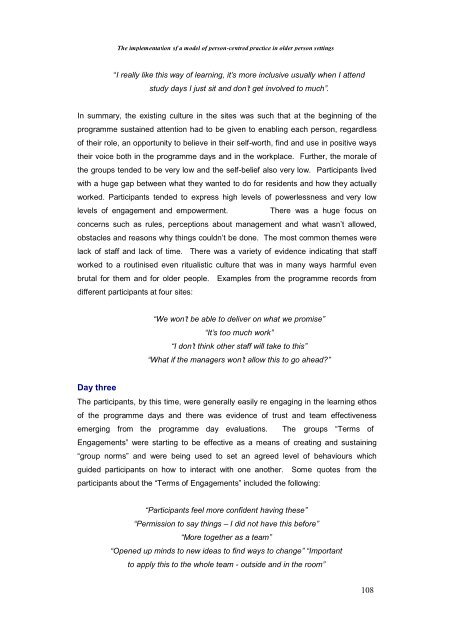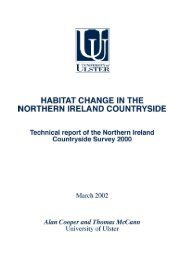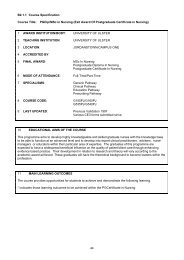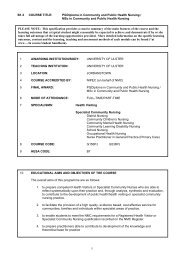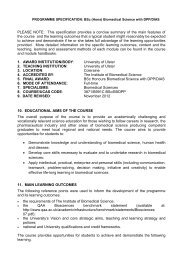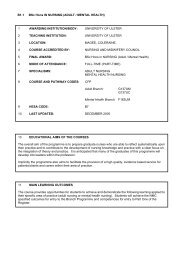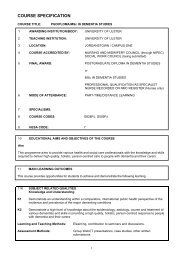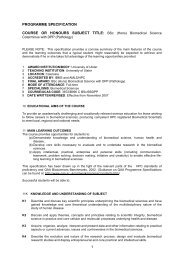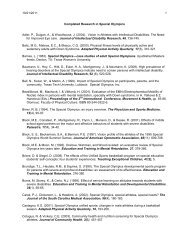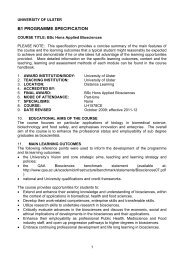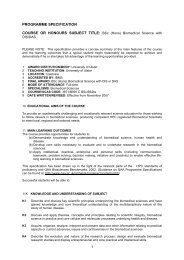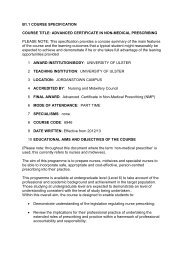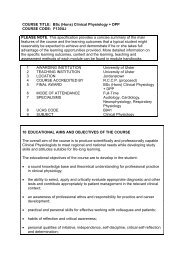The Implementation of a Model of Person-Centred Practice In Older ...
The Implementation of a Model of Person-Centred Practice In Older ...
The Implementation of a Model of Person-Centred Practice In Older ...
You also want an ePaper? Increase the reach of your titles
YUMPU automatically turns print PDFs into web optimized ePapers that Google loves.
<strong>The</strong> implementation <strong>of</strong> a model <strong>of</strong> person-centred practice in older person settings<br />
“I really like this way <strong>of</strong> learning, it’s more inclusive usually when I attend<br />
study days I just sit and don’t get involved to much”.<br />
<strong>In</strong> summary, the existing culture in the sites was such that at the beginning <strong>of</strong> the<br />
programme sustained attention had to be given to enabling each person, regardless<br />
<strong>of</strong> their role, an opportunity to believe in their self-worth, find and use in positive ways<br />
their voice both in the programme days and in the workplace. Further, the morale <strong>of</strong><br />
the groups tended to be very low and the self-belief also very low. Participants lived<br />
with a huge gap between what they wanted to do for residents and how they actually<br />
worked. Participants tended to express high levels <strong>of</strong> powerlessness and very low<br />
levels <strong>of</strong> engagement and empowerment.<br />
<strong>The</strong>re was a huge focus on<br />
concerns such as rules, perceptions about management and what wasn’t allowed,<br />
obstacles and reasons why things couldn’t be done. <strong>The</strong> most common themes were<br />
lack <strong>of</strong> staff and lack <strong>of</strong> time. <strong>The</strong>re was a variety <strong>of</strong> evidence indicating that staff<br />
worked to a routinised even ritualistic culture that was in many ways harmful even<br />
brutal for them and for older people. Examples from the programme records from<br />
different participants at four sites:<br />
“We won’t be able to deliver on what we promise”<br />
“It’s too much work”<br />
“I don’t think other staff will take to this”<br />
“What if the managers won’t allow this to go ahead?”<br />
Day three<br />
<strong>The</strong> participants, by this time, were generally easily re engaging in the learning ethos<br />
<strong>of</strong> the programme days and there was evidence <strong>of</strong> trust and team effectiveness<br />
emerging from the programme day evaluations. <strong>The</strong> groups “Terms <strong>of</strong><br />
Engagements” were starting to be effective as a means <strong>of</strong> creating and sustaining<br />
“group norms” and were being used to set an agreed level <strong>of</strong> behaviours which<br />
guided participants on how to interact with one another. Some quotes from the<br />
participants about the “Terms <strong>of</strong> Engagements” included the following:<br />
“Participants feel more confident having these”<br />
“Permission to say things – I did not have this before”<br />
“More together as a team”<br />
“Opened up minds to new ideas to find ways to change” “Important<br />
to apply this to the whole team - outside and in the room”<br />
108


